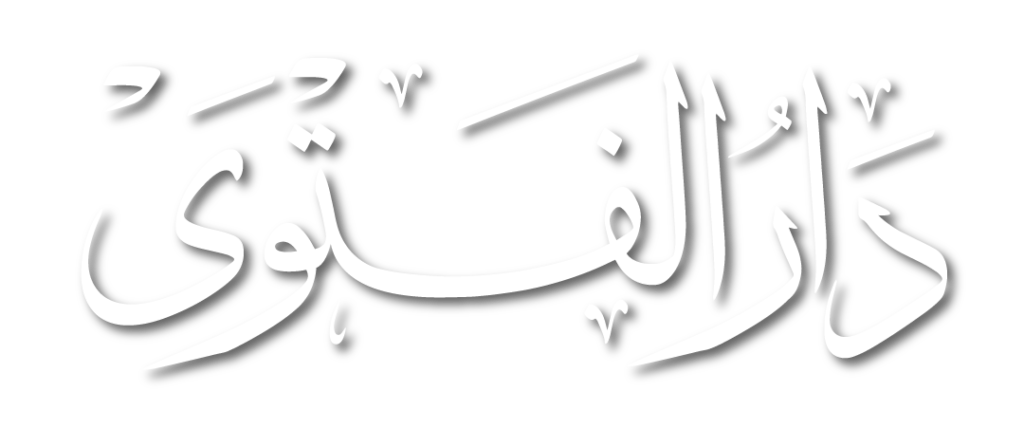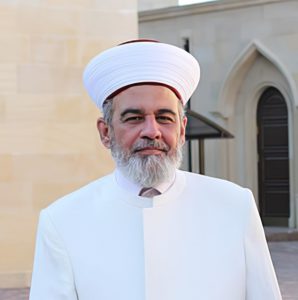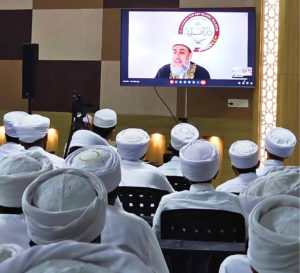Hafidh Abu Nu^aym narrated from the nephew of Az-Zuhriyy, who narrated from his uncle, that ^Umar Ibnul-Khattab used to love the poem of Labid Ibn Rabi^ah which has these verses:
إِنَّ تَقْوى ربّنَا خَيرُ نَفَلْ وبإذنِ الله رَيْثي وعَجَلْ
أحمَدُ الله فَلا نِدَّ لهُ بيَدَيْهِ الخيرُ ما شَاءَ فَعلْ
مَن هَداهُ سُبُلَ الـخَيرِ اهتَدى ناعِمَ البَالِ ومَنْ شَاءَ أضَل
[which means] “Certainly the obedience of our Lord is the best nafl [that which is given without obligation], and by the Will of Allah is my slowness and my swiftness. I praise Allah for there is no similarity for Him and He Owns and Creates the good, and whatever He Willed He Does. Whomever He Guided to the paths of goodness is guided and has a relaxed mind, and whomever He Willed He Misguides.”
The meaning of what Labid said:
إِنَّ تَقْوى ربّنَا خَيرُ نَفَلْ
is that the taqwa to our Lord is certainly the best nafl that the human being has been granted.
The meaning of his statement:
وبإذنِ الله رَيْثي وعَجَلْ
is that no slow person goes slow and no fast person goes fast except by the Will of Allah and His Permission.
When he said:
أحمَدُ الله فَلا نِدَّ لهُ
it means there is no similar to Him.
And when he said:
بيَدَيْهِ الخيرُ
what was meant by that is the good and the evil, and not just the good. He only settled with mentioning the good because there is something in the Arabic language called al-iktifa’ [sufficiency]. An example of that is the Saying of Allah:
﴿سَرَابِيلَ تَقِيكُمُ الـحَرَّ﴾
[which means] “Allah Created clothing for you that protects you from the heat.” This also means “and the cold,” because the clothing protects from both matters, not only the heat.
When the poet said:
ما شَاءَ فَعلْ
it means whatever Allah Willed to take place must take place and whatever He did not Will to take place will not take place.
And when he said:
مَن هَداهُ سُبُلَ الـخَيرِ اهتَدى
this means that whomever Allah Willed to be on the straight, correct path is guided.
When he said:
ناعِمَ البَالِ
it means his mind is tranquil.
When he said:
ومَنْ شَاءَ أضَل
it means whomever Allah Willed to be misguided, then Allah Misguides him.
Al-Bayhaqiyy narrates from Ash-Shafi^iyy that he said when he was asked about destiny:
مَا شِئتَ كانَ وإن لم أَشَأ وما شِئت إن لم تَشَأ لم يَكُن
خَلَقتَ العِبادَ على ما عَلمِت ففي العلمِ يجري الفَتَى والـمُسِنعلى ذا منَنْتَ وهذا خَذَلْتَ وهذا أَعنتَ وذا لم تُعِنْ
فمِنهُم شَقيٌّ ومنهم سَعيدٌ وهذا قبيحٌ وهذا حَسَن
[which means] “O Allah, whatever You Willed was [i.e., You Made it come into existence] even if I did not will; and whatever I willed, if You did not Will then it will not be. You Created the slaves according to what You Knew, and according to that Knowledge the young person and the old person will run [i.e., act]. And You have Endowed upon this one and that one you have Forsaken, and You have Empowered this one and that one You did not Empower. So among them are those who will die as blasphemers and among them are those who will die as believers, and this one is ugly and this one is beautiful.”





